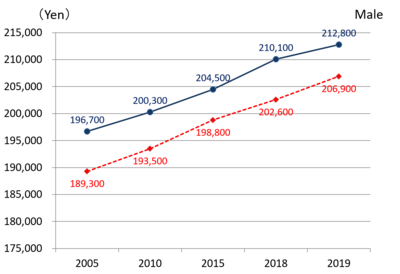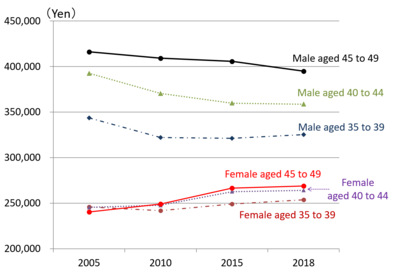Column Finance and the Social Security System 2020.01.15
【Aging, safety net and fiscal crisis in Japan】No. 209 Wages for male workers aged 35 to 49 is decreasing.
According to the economic statistics released by the Cabinet Office in December 2019, the GDP growth rate in FY2018 was 0.3% in real terms, and 0.1% in nominal terms. In other words, the GDP deflator has again returned to the deflationary state of minus 0.2%, from the positive 0.1% in FY2017.
The main reason is sluggish personal consumption. As shown in Figure 1, the average initial wages for university graduates have risen because of a shortage in the labor force. However, the average monthly wages for male workers aged 35 to 49 have been decreasing for more than 10 years. This age group is struggling with children's education costs and mortgage repayments. Moreover, the increase in social insurance premiums has spurred a decline in their disposable income (wages minus taxs/social insurance premiums). To overcome this, it is essential to reform the social security system to increase the burden on the elderly and reduce the burden on the working generation.
Figure 1 Average initial wages for university graduates

(Source) Ministry of Health, Labour and Welfare, 2019 Overview of the initial salary survey
Figure 2 Average monthly wages for workers aged 35 to 49

(Source) Ministry of Health, Labour and Welfare, Wage structure basic statistics
